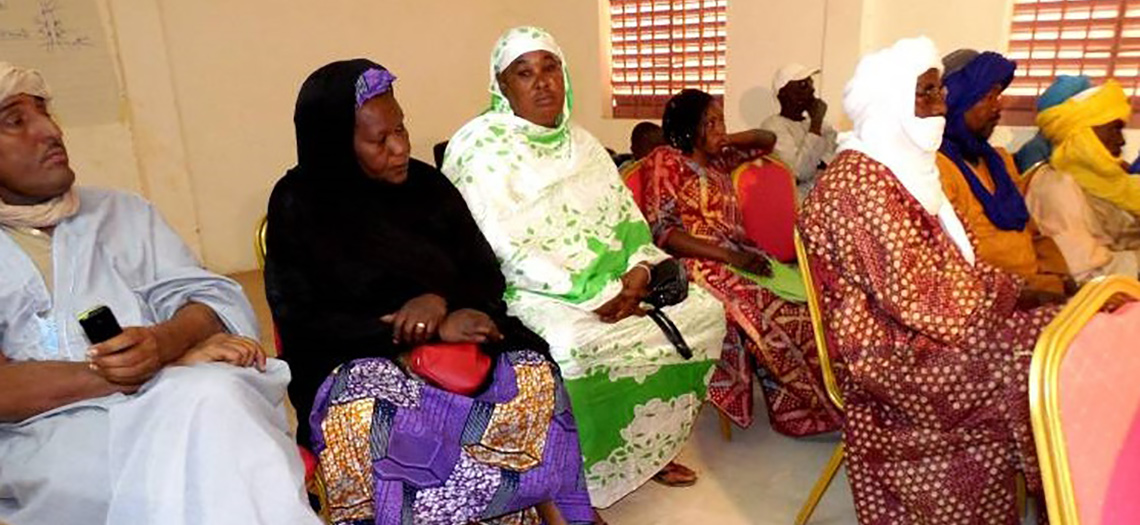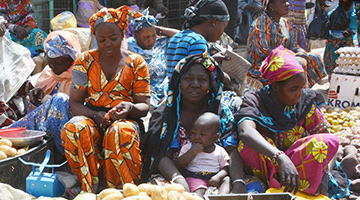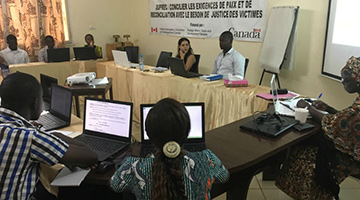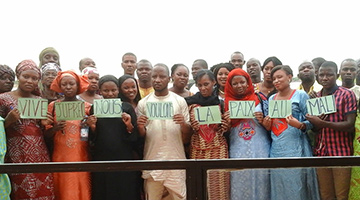Dialogue, truth and reconciliation: The long road to peace in Mali
People attending an intercommunity assembly organized as part of the Canada-funded JUPREC project, to discuss reconciliation and peace. | Photo credit: Lawyers Without Borders Canada
JUPREC has trained close to 1,400 women in leadership, conflict resolution and defending the rights of victims.
Some 60 men and women are gathered at the office of the mayor of Goundam, in Mali. Elected officials, religious heads and leaders of women’s associations: every group and commune in the Timbuktu region is discussing reconciliation and peace.
During the 2012 conflict, their clan members suffered deeply, particularly refugee families and the victims of serious abuse such as sexual violence. Dialogue is difficult but necessary to consolidate peace.
Lawyers Without Borders Canada, the Centre for International Studies and Cooperation and the École Nationale d’Administration Publique supported the creation of these intercommunity assemblies as part of the Justice, prévention et reconciliation (JUPREC) project [French only], with Canada’s support.
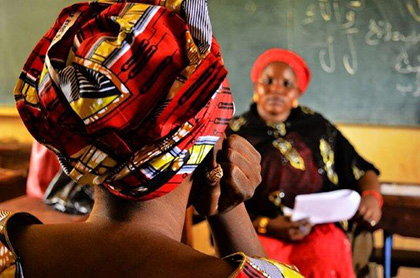 A young survivor of gender-based violence tells her story. The Canada-supported JUPREC project helps raise awareness of the importance of ending violence against women and girls, and helps victims of violence access justice. | Photo credit: Lawyers Without Borders Canada
A young survivor of gender-based violence tells her story. The Canada-supported JUPREC project helps raise awareness of the importance of ending violence against women and girls, and helps victims of violence access justice. | Photo credit: Lawyers Without Borders CanadaOne of the primary goals of these assemblies is to tell and acknowledge the truth, a key element in traditional Malian justice. The victims of the conflict want to contribute and be heard so that justice is served.
Local JUPREC partners have conducted extensive consultations with 3,755 victims. The consultations paint a clear picture of the conflict and represent a major advance for reconciliation and the struggle against impunity in Mali.
JUPREC is also seeking mechanisms to peacefully resolve current and future conflicts. Peace committees have been created and tasked with intervening in communities.
In the commune of Soumpi, a peace committee helped bring an end to hostilities between two groups over the use of a well for watering livestock. By starting a dialogue and creating a schedule for well usage, the committee re-established a sense of security.
Women have great skills as agents of peace in such circumstances. They are influential mediators in their communities, where they have intimate knowledge of the social dynamics.
JUPREC has trained close to 1,400 women in leadership, conflict resolution and defending the rights of victims. In recent local elections, 18 were elected as commune or village counsellors. The project also improved access to justice for victims of conflict by supporting civil society organizations. As a result, the cases of 99 victims of serious human rights violations (including 62 women and 16 minors) were taken care of by four Malian lawyers.
Canada is proud to support Malians’ participation in the peace process, and in rebuilding their country’s institutions.
Related Links
- Date Modified:
